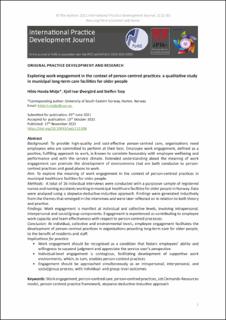| dc.contributor.author | Midje, Hilde Hovda | |
| dc.contributor.author | Øvergård, Kjell Ivar | |
| dc.contributor.author | Torp, Steffen | |
| dc.date.accessioned | 2021-12-08T12:44:53Z | |
| dc.date.available | 2021-12-08T12:44:53Z | |
| dc.date.created | 2021-11-19T10:30:03Z | |
| dc.date.issued | 2021 | |
| dc.identifier.citation | Midje, H. H., Øvergård, K. I., & Torp, S. (2021). Exploring work engagement in the context of person-centred practices: a qualitative studyin municipal long-term care facilities for older people. International Practice Development Journal, 11(2), Artikkel 6. | en_US |
| dc.identifier.issn | 2046-9292 | |
| dc.identifier.uri | https://hdl.handle.net/11250/2833355 | |
| dc.description.abstract | Background: To provide high-quality and cost-effective person-centred care, organisations need employees who are committed to perform at their best. Employee work engagement, defined as a positive, fulfilling approach to work, is known to correlate favourably with employee wellbeing and performance and with the service climate. Extended understanding about the meaning of work engagement can promote the development of environments that are both conducive to person-centred practices and good places to work.
Aim: To explore the meaning of work engagement in the context of person-centred practices in municipal healthcare facilities for older people.
Methods: A total of 16 individual interviews were conducted with a purposive sample of registered nurses and nursing assistants working in municipal healthcare facilities for older people in Norway. Data were analysed using a stepwise-deductive-inductive approach. Findings were generated inductively from the themes that emerged in the interviews and were later reflected on in relation to both theory and practice.
Findings: Work engagement is manifest at individual and collective levels, involving intrapersonal, interpersonal and social/group components. Engagement is experienced as contributing to employee work capacity and team effectiveness with respect to person-centred processes.
Conclusion: At individual, collective and environmental levels, employee engagement facilitates the development of person-centred practices in organisations providing long-term care for older people, to the benefit of residents and staff.
Implications for practice:
- Work engagement should be recognised as a condition that fosters employees’ ability and willingness to suspend judgment and appreciate the service user’s perspective.
- Individual-level engagement is contagious, facilitating development of supportive work environments, which, in turn, enables person-centred practices.
- Engagement should be approached simultaneously as an intrapersonal, interpersonal, and social/group process, with individual- and group-level outcomes. | en_US |
| dc.language.iso | eng | en_US |
| dc.relation.uri | https://www.fons.org/library/journal/volume11-issue2/article6 | |
| dc.rights | Navngivelse-Ikkekommersiell 4.0 Internasjonal | * |
| dc.rights.uri | http://creativecommons.org/licenses/by-nc/4.0/deed.no | * |
| dc.title | Exploring work engagement in the context of person-centred practices: a qualitative study in municipal long-term care facilities for older people | en_US |
| dc.type | Peer reviewed | en_US |
| dc.type | Journal article | en_US |
| dc.description.version | publishedVersion | en_US |
| dc.rights.holder | © The Authors 2021. | en_US |
| dc.source.volume | 11 | en_US |
| dc.source.journal | International Practice Development Journal | en_US |
| dc.source.issue | 2 | en_US |
| dc.identifier.doi | https://doi.org/10.19043/ipdj.112.006 | |
| dc.identifier.cristin | 1956292 | |
| dc.relation.project | Norges forskningsråd: 286454 | en_US |
| dc.source.articlenumber | 6 | en_US |
| cristin.ispublished | true | |
| cristin.fulltext | original | |
| cristin.qualitycode | 1 | |

